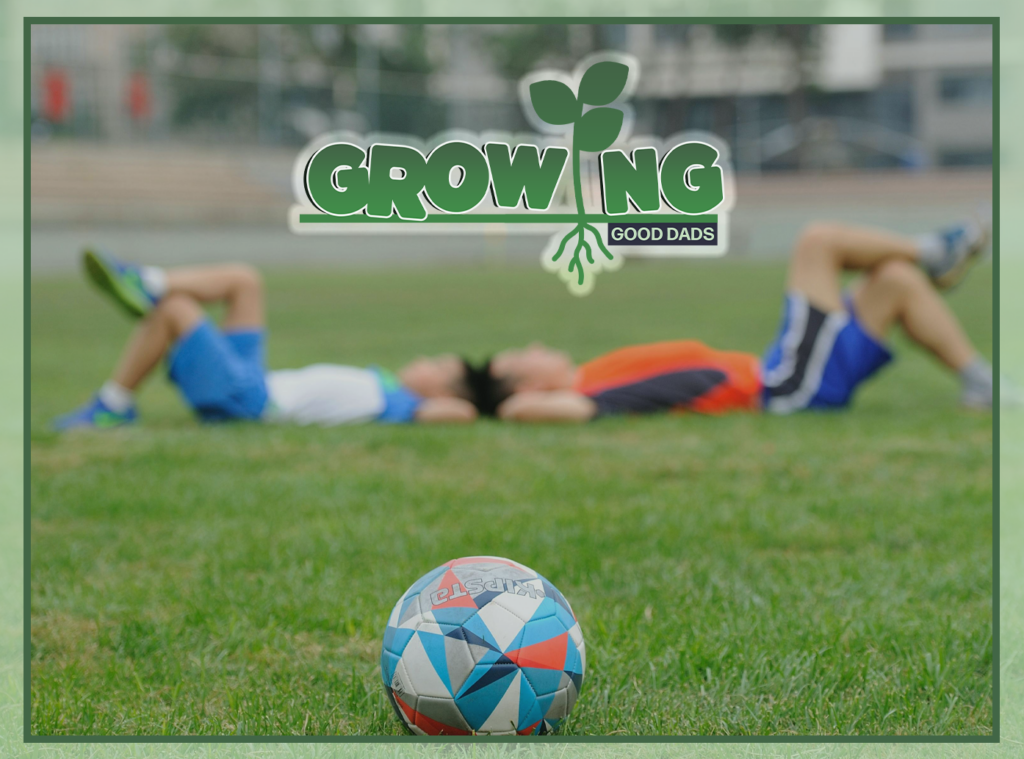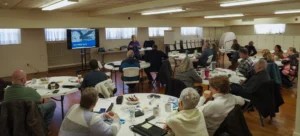This month on the Growing Good Dads blog, we’re diving into the ways you can be a good dad to preteens. Children at this age are in a period of growth and discovery: they’re learning who they are and figuring out their passions by becoming more independent.
On recent episodes of the Good Dads podcast, father of two and football coach Frank Tristan joined us to talk about the balance between parenting and coaching, as well as helping your child find their passions. This week on the blog, we’re summarizing our favorite takeaways from our conversation with Frank.
Kids, sports, and the rewarding aspects of coaching
Frank told us what compelled him to pursue coaching as a career. “In high school and college, both my coaches were influential,” Frank said on the podcast. “My dad was obviously so important, but those guys cemented who I wanted to be in life, and I was like ‘Man, I could do that, that would be awesome and rewarding.’”
When asked about the most rewarding aspects of coaching, Frank said “(Seeing) that kid that maybe doesn’t have the support at home and you connect with him and you see him develop.”
The ABC Technique
Frank and his wife have a system for determining whether their child will actually be interested in a sport. This system can apply to any hobby that your child is considering dabbling in, and it’s a great strategy for dads to employ as they support their preteens in sports, extracurriculars and other hobbies.
A=Ask
Just ask your kids, “do you want to play?” Have an open conversation with them and observe their actions.
It may seem like a no-brainer, but sometimes getting excited and caught in the moment causes parents to put their kid in an activity they might not be interested in.
“It’s a point of connection for the parent,” Frank said. “You can really enjoy that time of sitting out in the sun and enjoying the ball game—but maybe your kid doesn’t.”
Frank gave the example of his daughter being really good at golf. Despite having success with it, she told her dad she didn’t want to play it. He said that was perfectly okay and they could always find something else she’s interested in.
Don’t be afraid to ask your kids about their interests. Search for opportunities to have that conversation and to ask about a certain activity while watching what they do. Are they looking forward to practice, or do they dread it? Do they watch the sport on TV, or would they rather watch anything else? These are questions to consider.
B=Balance
Keep things balanced. Frank mentioned that he played multiple sports in high school and college. His mother urged him to stay well-rounded and to stay connected among his peers by being involved in more than one sport. It’s good to compete in a variety of arenas, and you won’t know if you’re good at a sport until you try it.
But how much is too much?
“One of the things I’m working at—but my wife is very good at—is the ability to say no,” Frank said.
If it gets to be too much, you have to learn how to say no. Pay attention to what sports are available during each season and make sure your kiddos aren’t overexerting themselves.
“We can be well-rounded,” Frank suggested. “We don’t know how kids are gonna develop and what they’re going to fall in love with.”
C=Competitive
“If you’re going to do something, you’ve gotta be your best,” Frank said. “You’ve gotta work hard and want to compete.”
If the activities your child is trying out don’t adhere to the ABCs, Frank suggested trying something else. Going along with the B in ABCs, finding a balance and seeing what sticks is sometimes the best strategy for parents trying to find what interests their child.

Finding a balance between parenting and coaching
It’s easy to see how being a dad a family is similar to being a coach of a sports team: The skills and strategies employed in coaching and parenting alike can help set your preteens up for success. Frank shared two important lessons to remember in both parenting and coaching.
Consistency is key
We all benefit from routines, and children of all ages need consistency to feel safe. When your children know what to anticipate and understand the patterns of daily life, it helps them build a sense of belonging and self-confidence.
“Whatever makes me mad on Monday had better make me mad Friday,” Frank said. “It’s a consistent line.”
In other words, dads ought to look for ways to build consistency into their preteens’ schedules. Maintaining a consistent bedtime and tracking responsibilities on a chore chart are examples of healthy habits.
Being consistent and firm in your beliefs can apply to both parenting and coaching.
“At the end of the day, it’s a marathon, not a sprint,” he continued. “Once you’ve done it a little bit with some length to it, you realize ‘it’ll all work out.’ We just have to be consistent.”
Don’t be demeaning or disrespectful
Frank discussed the importance of not bashing the coach and not bashing other players when you’re on a team. It’s counterproductive and helps no one.
Additionally, you have to know your worth on the team and stand up for other players because the same rules apply to the coach. A coach shouldn’t demean their players, either, Frank said.
Put forth the effort and have a good attitude
“The thing you can control is your effort and attitude,” Frank said. “So that’s how I’m gonna judge if I’m proud of you or not.”
In both sports and parenthood, it’s important that you try your best and have a good attitude. You’re not going to be in the best mood all the time, but it’s important to find a balance.
“If you strike out four times, we’ll get them next time,” Frank said. “But let’s have a good attitude and give great effort.”
Be in it for the kids, not for yourself
A philosophy that goes with coaching as well as parenting is doing things for the benefit of your children. Frank mentioned that some people want to coach a team just so they can win games, but if that’s your sole reason for coaching a sports team, then it’s not a strong motivator.
The same goes for parenting. There are going to be wins as well as losses in life. You have to be in it for your children in order to be the best parent you can be.
Get a good amount of sleep
“If you’re not sleeping on a regular basis, your body’s out of whack, you’re not gonna reach your full potential,” Frank said. “Your body’s gonna wear down.”
Getting a good amount of sleep is an important step to staying healthy, and not getting enough sleep will take a toll on your body. Getting enough sleep will also help with your effort and your attitude.
Understand your child’s identity isn’t in the sport
Your child is much more than the sport they play. Your child should never feel like they’re letting you down if they don’t want to play a particular sport.
“I think it’s so important that kids understand their identity is not in a sport,” Frank said. “That’s a scary thing when kids get wrapped up in only their approval of how good they can hit a baseball or kick a soccer ball or spike a volleyball. That gets really dangerous.
“I just tell my kids that ‘if you want to stop playing sports now, I still love you.’”
Final Words
“The opposite of love is selfishness,” Frank said. Sometimes, you have to put others before yourself. That goes for both coaching a sports team and parenting your family.
“You love your family, you’re gonna work for the family.”






